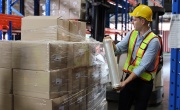A Life of Eco Principle
Michael Braungart, one of the creators of the cradle-to-cradle design principle, was featured in Resource two years ago. Here, he talks to Jo Moulds about his philosophies and lets us know more about his thoughts on 'eco-efficiency'.
 Professor Michael Braungart, chemist, author and co-founder of design company McDonough Braungart Design Chemistry (MBDC), alongside award-winning architect, designer, educator and author on sustainability issues William McDonough, has spent his career looking at ways of making products more eco-efficient. Michael and William are also the authors of the well-known 2002 book Cradle To Cradle: Remaking the Way We Make Things (North Point Press), a manifesto calling for the transformation of human industry through ecologically intelligent design.
Professor Michael Braungart, chemist, author and co-founder of design company McDonough Braungart Design Chemistry (MBDC), alongside award-winning architect, designer, educator and author on sustainability issues William McDonough, has spent his career looking at ways of making products more eco-efficient. Michael and William are also the authors of the well-known 2002 book Cradle To Cradle: Remaking the Way We Make Things (North Point Press), a manifesto calling for the transformation of human industry through ecologically intelligent design.
Michael started his career following studies in process engineering in Darmstadt, Germany, by exploring the chemical processes of industrial production techniques with the Chemistry Department at Konstanz, Germany. In 1978, he became one of the founding members of a political group, which later became the Green Party in Germany. As a result of this work he became known among environmentalists and Greenpeace asked him to work with them. He took up the offer and by the time he had completed his PhD in Chemistry at the University of Hannover in 1985, he was director of Greenpeace’s chemistry department.
While working with Greenpeace, Michael came to the conclusion that there was more opportunity for change by working with, rather than against, industry. In 1987, with funding from Greenpeace, he started EPEA International (the Environmental Protection Encouragement Agency). He and McDonough now work with some of the world’s largest corporations, including Nike and Ford, on issues such as materials assessment, waste and energy balances, life cycle design and designing for disassembly.
“I met Bill in 1991,” says Michael, “when the EPEA had a reception in New York City celebrating the opening of its American offices. The reception was at a rooftop garden, and as we looked out over the city, we both saw possibilities to make products in a much better way.
“I mentioned my idea to make a biodegradable soda bottle with seeds in it, so that you could simply throw it on the ground and plant a tree at the same time. We also talked about the toxicity of common, everyday products. For example, shoe soles commonly contain hazardous chemicals, particles of which abrade and are taken up by the nose, mouth and lungs as people wear down their shoes. We both saw that there were a lot of poorly designed products that could be made much, much better. While we each maintained our respective companies, McDonough + Partners and EPEA, we founded MBDC in 1994 to put our ideas into practice.”
One of the main ways that Michael and William work with industry is by starting dialogues with top management and young scientists who are the leading thinkers within businesses. “With big companies, it’s the individuals in the top management who understand that we cannot continue to make things ‘less bad’ because less bad is no good,” explains Michael. “Middle management in a lot of cases hates us because they have tried to be less bad for 20 years with all the guilt management – whether you want to reduce your footprint, apologise for being on this planet or are trying to make zero emissions. The top management’s responsibility is to be effective, to say: ‘What is the goal? How can we reach innovation? How can we make sure that our brand has a long-term perspective as well?’”
An example of the way that Michael and William work is their involvement with the development of the compostable fabric lines Climatex®Lifecycle™ and Climatex®LifeguardFR™. Climatex is an upholstery fabric – a mix of New Zealand wool and ramie, a compound natural fibre in use 4,000 years ago in Egypt and now organically grown in the Philippines – which is completely compostable. In other words, it is safe to go back into soil and is produced in mills where the water that goes into the process comes out as clean as the water that goes in.
After five years in development, Climatex products are now used in 60 per cent of the world’s passenger airlines, and the small mill in Switzerland that originally produced the fabric has been bought by a giant manufacturer to learn about the fabrics of the future. Michael describes the development of Climatex as “a little bit too successful”. The CEO of the original mill, Albin Kälin, lost his position in the buyout and so MBDC has hired him as its managing director. “We still keep a friendly and professional relationship with the manufacturers of Climatex to ensure that the material maintains the same quality.”
Waste and run-on from the Climatex mill is made into felt that can be used as garden mulch and in the cultivation of strawberries, cucumbers and a wide range of other plants. The production process is so neat that, when the water came to be tested, analysts suspected the machinery must have been broken because the water was so clean. Climatex is what can be described as a perfect example of an “ecologically-intelligent” product.
If you ask Michael what he thinks of all the current talk about climate change and tipping points and how the climate change debate fits with his philosophy, he doesn’t hold back: “Definitely, there is a point of no return when you are not able to deal with the problem anymore. The planet will destroy itself, because the warmer it becomes, the less possibility there is to store gases in oceans, and the more thunderstorms we have, the more erosion will take place. We’ll lose our resources to make innovation, because we’ll have to repair the damage. But the Stern Review is somehow stupid and inhumane. Millions of people are already suffering and losing their lives because we don’t take care of the Earth’s climate or soil erosion, for example, and we steal their food to feed our agricultural industry with the cheapest things.
“Our foreign aid is not at all focusing on fighting against poverty. We somehow deliberately let people die in Africa. It would cost one cent per child a day to provide a child with healthy drinking water, and yet millions of children are dying. How can Mr Stern be so cynical?”
There are certain people that Michael looks to for providing inspiration and to encourage his own work: “Bill McDonough, my friend and partner, for one. But most of the leading thinkers now come out of companies, no longer out of universities or research institutes. These are, for example, Tim O’Brien (Ford Motor Company), Adam Lowry (Method), Rüdiger Ziegler (Unilever), and Rolf Kunish (Beiersdorf).
“An interesting development is the proposed transformation of Wal-Mart into a sustainable company. It will be exciting to see what happens with Wal-Mart subsidiaries in the UK. When you want to learn about real issues, it’s always good to read around the subject and there are some industrial leaders like Dominique Conseil who really profoundly work on Triple Top Line instead of Triple Bottom Line work.”
Another recent collaboration is an Internet platform, Fair Planet (www.fairplanet.net), which has been founded by Josef Reich. This works on creating simple, detailed products – such as the world’s first chemical-free T-shirts designed to be kinder to skin. EPEA is also planning to open an office in London, and is currently looking for office space and people who might be willing to join the EPEA in London. A further series of cradle-to-cradle workshops in London is also planned.
An initiative that is a proud moment for Michael Braungart and William McDonough is a film, The Next Industrial Revolution and the Birth of the Sustainable Economy. Narrated by Susan Sarandon, the actress married to Tim Robbins, it follows the stories of five projects in the US and Europe that represent MBDC’s work. “We were lucky with the association with Susan Sarandon,” says Michael. “She had read Cradle to Cradle, the book, and wanted to support the project so, in the end, she lent us her voice.”
These are the types of associations that mark out MBDC’s work. They have won numerous awards over the years and, to date, 100 products have been given cradle-to-cradle status. “One of the reasons for coming to London,” says Michael, “is to work with the many talented young scientists and designers that are based in the UK. I like the mentality of British people. You like quality, and you think it’s better to have a sense of humour than a sense of tumour!”
And, with that, Michael is off to work on more of his many projects – all concepts to keep an eye on.
Braungart’s work has been published in numerous journals on science, public affairs, design and environment in Europe and the US.
For more information, visit www.mbdc.com




